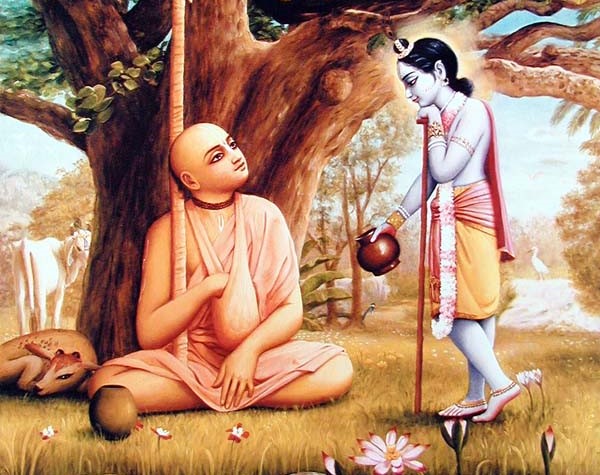
In the early seventies, Janis Joplin had a big hit with the song “Mercedes Benz.” The song was a bit of a send-up of praying for material things. The first verse went:
Oh Lord, won’t you buy me
A Mercedes Benz?
My friends all drive Porsches
I must make amendsI worked hard all my lifetime
No help from my friends
Oh Lord, won’t you buy me
A Mercedes Benz?

Some people see God as the person to turn to for things they can’t get from Amazon.com. They simply see Him as the order-supplier or super-waiter in the sky, and they only pray to ask for material things. And this is better than not relating to God at all. Although we should primarily pray to Krishna for the opportunity to serve Him, and that our faith and love might grow stronger, it is not wrong to turn to Krishna to ask for help when we are distressed or in trouble. Perhaps we are not yet pure devotees, and experience some anxiety about how we will survive, will we have food to eat and a place to live, clothes to wear etc. Especially for a householder supporting a family, there may be times when we worry about our material well-being. And at such times, who else can we turn to but Krishna, Who is described as “… maintainer of the people” in Bhagavad-gita, verse 1:43.
In the Katha Upanishad [2:2:13] it is said, “nityo nityanam cetanas cetananam.” Srila Bhaktivedanta Swami Prabhupad quoted this verse in numerous places throughout his books and lectures:
He is actually the maintainer of all living entities. Nityo nityanam: He is the chief of all living entities; He is one, but He maintains many, many living entities. God maintains all other living entities, but no one can maintain God. That is His svacchanda-sakti; He is not dependent on others. Someone may call himself independent, but he is still dependent on someone higher. The Personality of Godhead, however, is absolute; there is no one higher than or equal to Him.
[Bhaktivedanta Swami Srimad Bhagavatam 3:24:33 purport]
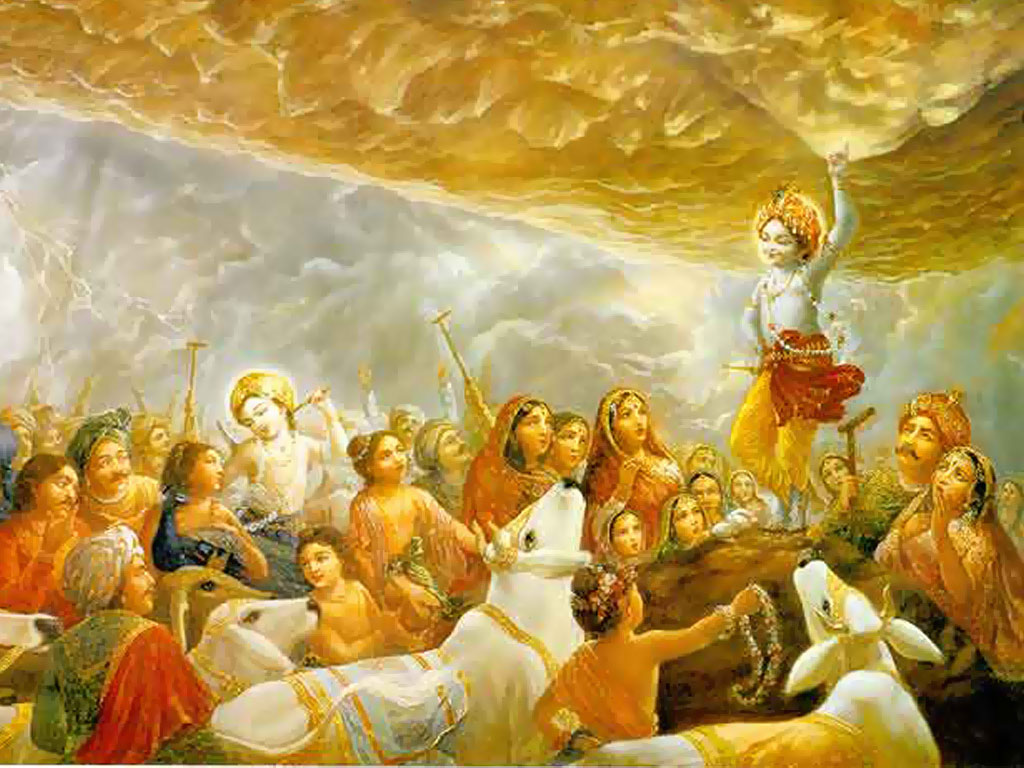
So, the Supreme Lord is the maintainer of innumerable living entities – He looks after the maintenance of living entities in all species of life, in innumerable universes. He is providing food for the microbes within my body, the ants in my yard, the elephants in the jungle and whales in the ocean. At times we may think, “With all of these living entities to look after, perhaps He will forget about me – I am very insignificant, will I be fed also?” But the Supreme Lord does not ever forget anyone – He expands Himself as the Paramatma and accompanies us through innumerable lifetimes in innumerable species of life. When I was a germ, He was with me. Through all of my acts of cruelty He never abandons me. Of course, if I act sinfully, I may suffer as a result of my actions, but He never abandons me and He is always totally aware of my needs – He is in my heart and knows my needs, thoughts and desires better than I do.
Another name for Lord Chaitanya is “Visvambhara,” or the “Maintainer of the Universe.” It is not wrong, during times of stress or worry to pray to Krishna or Lord Chaitanya, “Lord, please maintain me, please help me, I am full of anxiety, I am afraid” or “I am lonely.” Krishna always provides for and maintains His devotees. As our love and understanding of Krishna’s unconditional love for us grows, our faith that he will provide for us also grows, and we are less in anxiety about such things. We see that we are always being looked after and protected by the Lord, Who is our dear-most friend.
Srila Bhaktivedanta Swami once told of how during the Second World War there was a great shortage of food in India and thousands of people starved to death – they were dependent on the British who were struggling in their fight against Germany. However, Srila Bhaktivedanta Swami said that he did not know of one devotee of Krishna who ever missed a meal during this time. He gave this as an example of how Krishna provides for His devotees. And in his purport to Bhagavad-gita 16:1-3 he states:
One must be fully convinced that Krishna or the Supreme Personality of Godhead in His localized aspect as Paramatma is always within, that He is seeing everything and that He always knows what one intends to do. One must thus have firm conviction that Krishna as Paramatma will take care of a soul surrendered to Him. “I shall never be alone,” one should think. “Even if I live in the darkest regions of a forest I shall be accompanied by Krishna, and He will give me all protection.” That conviction is called abhayam, without fear./
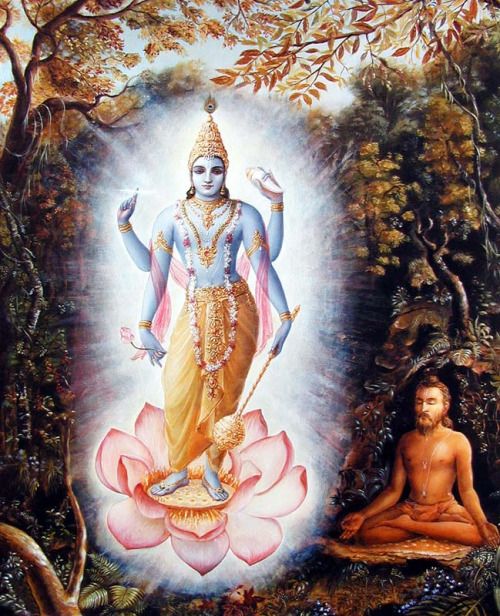
When Jesus gave his Sermon on the Mount, he addressed the worries that his followers had with regard to their material needs:
Therefore I tell you, do not worry about your life, what you will eat or drink; or about your body, what you will wear. Is not life more than food, and the body more than clothes? Look at the birds of the air; they do not sow or reap or store away in barns, and yet your heavenly Father feeds them. Are you not much more valuable than they? Can any one of you by worrying add a single hour to your life? And why do you worry about clothes? See how the flowers of the field grow. They do not labor or spin. Yet I tell you that not even Solomon in all his splendor was dressed like one of these. If that is how God clothes the grass of the field, which is here today and tomorrow is thrown into the fire, will he not much more clothe you—you of little faith? So do not worry, saying, ‘What shall we eat?’ or ‘What shall we drink?’ or ‘What shall we wear?’ For the pagans run after all these things, and your heavenly Father knows that you need them. But seek first his kingdom and his righteousness, and all these things will be given to you as well. Therefore, do not worry about tomorrow, for tomorrow will worry about itself. Each day has enough trouble of its own.
[Matthew 6:25-34]
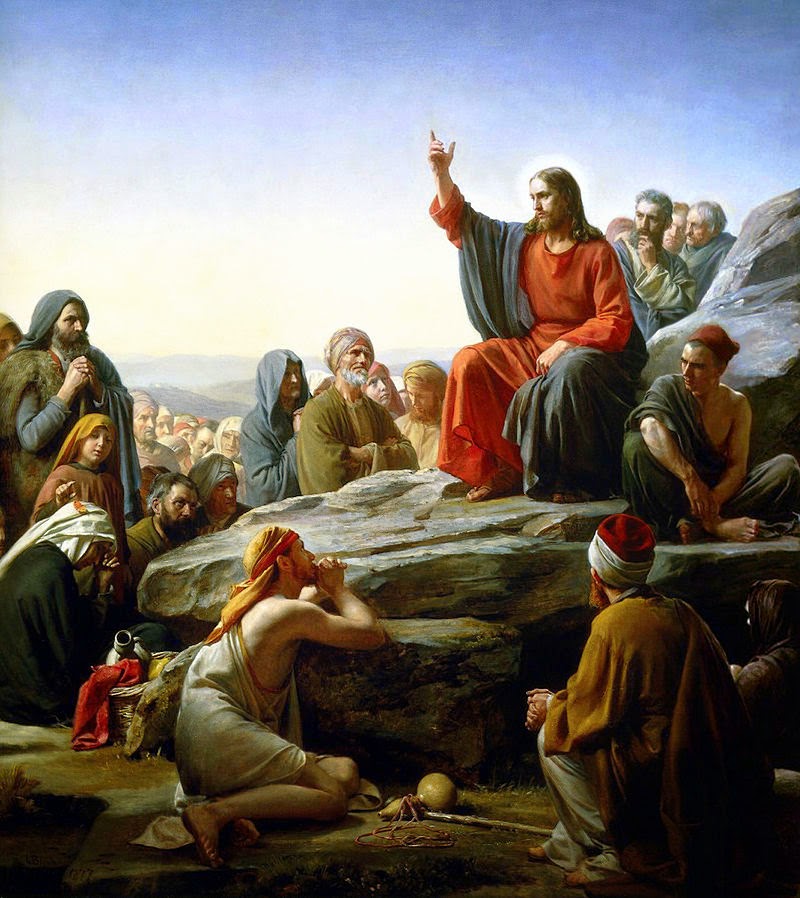
So here, Jesus was not simply chastising his disciples, he was trying to relieve their worry and anxiety about their material needs being met, and trying to increase their faith. He was reassuring them that if they are endeavoring to come closer to God, trying to serve Him and offer their life and service to Him, that He will look after them, He will maintain them.
In the Srimad Bhagavatam, Dhruva Maharaj described the Lord as being “the causelessly merciful maintainer,” likening the Lord to a cow who lovingly provides for her calf:
My Lord, O Supreme Lord, You are the supreme personified form of all benediction. … To ignorant devotees like me, You are the causelessly merciful maintainer, just like a cow, who takes care of the newly born calf by supplying milk and giving it protection from attack.
[Srimad Bhagavatam 4:9:17]
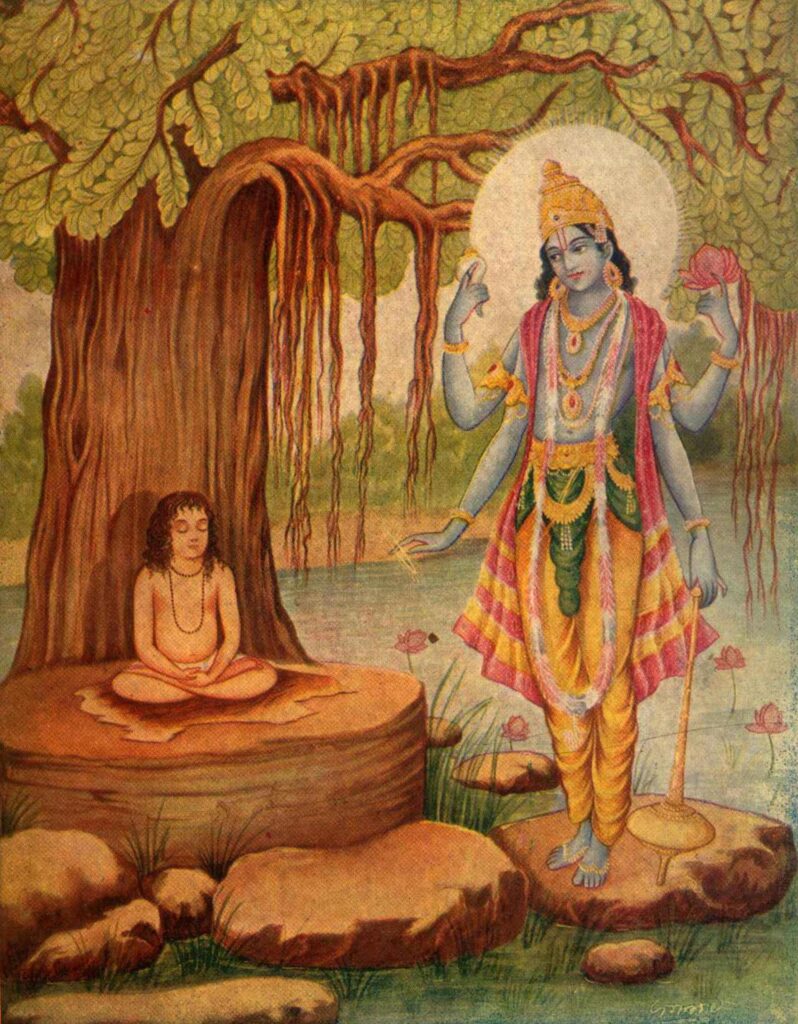
It is sometimes seen that in order to help a weak but sincere devotee to take complete shelter in Him, Krishna will take away a devotee’s wealth and possessions if he is too attached to material enjoyment. Therefore, although Krishna maintains His devotees, this does not mean that he satisfies every material desire his devotee may have. Krishna always acts in the best interest of His devotees, and although He minimizes their suffering, it is not always in their best interest to be totally free from suffering within the material world. Krishna brings His devotees home to Him with a carrot and a stick. The carrot is the happiness derived from service to Krishna. And the stick is the suffering of the material world. Krishna never allows His devotees to become too comfortable while living in martya-loka, the world of death. Srila Bhaktivedanta Swami described a devotee’s attitude to suffering in numerous places in his books and lectures:
Those who are truly vipascit, or learned, are those who have reached the platform of understanding and observing the Supreme Personality of Godhead in any condition of life. … Learned devotees accept even conditions of distress as representing the presence of the Supreme Lord. When a devotee is in distress, he sees that the Lord has appeared as distress just to relieve or purify the devotee from the contamination of the material world. While one is within this material world, one is in various conditions, and therefore a devotee sees a condition of distress as but another feature of the Lord:
My dear Lord, one who earnestly waits for You to bestow Your causeless mercy upon him, all the while patiently suffering the reactions of his past misdeeds and offering You respectful obeisances with his heart, words and body, is surely eligible for liberation, for it has become his rightful claim.
[Srimad Bhagavatam 10:14:8]
A devotee, therefore, regards distress as a great favour of the Lord because he understands that he is being cleansed of contamination. “… for him I am the swift deliverer from the ocean of birth and death.” [Bhagavad-gita12:7]. The appearance of distress is a negative process intended to give the devotee relief from this material world, which is called mrtyu-samsara, or the constant repetition of birth and death. To save a surrendered soul from repeated birth and death, the Lord purifies him of contamination by offering him a little distress. This cannot be understood by a non-devotee, but a devotee can see this because he is vipascit, or learned. A non-devotee, therefore, is perturbed in distress, but a devotee welcomes distress as another feature of the Lord.
[Bhaktivedanta Swami from purport Srimad Bhagvatam10:2:28]
Krishna describes in Bhagavad-gita that a devotee should not be disturbed or in anxiety in happiness or distress:
One who is not envious but who is a kind friend to all living entities, who does not think himself a proprietor, who is free from false ego and equal both in happiness and distress, who is always satisfied and engaged in devotional service with determination and whose mind and intelligence are in agreement with Me – he is very dear to Me. He for whom no one is put into difficulty and who is not disturbed by anxiety, who is steady in happiness and distress, is very dear to Me.
[Bhagavad-gita 12: 13-15]
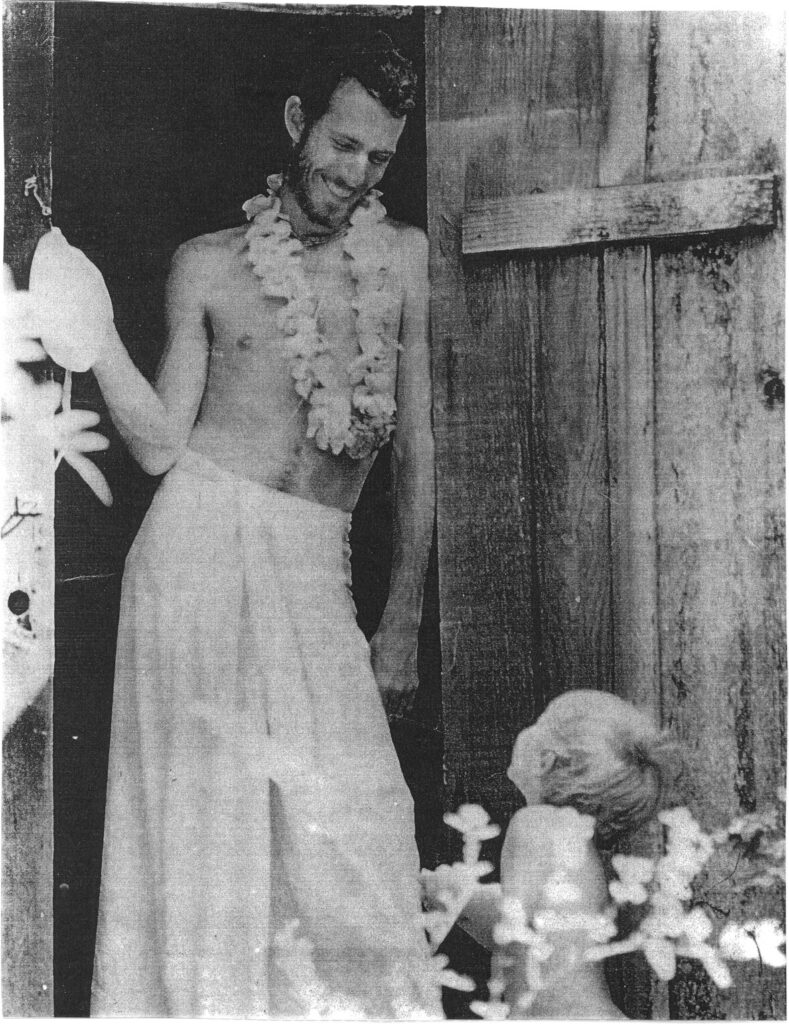
In his purport to these verses, Srila Bhaktivedanta Swami further describes the attitude of a devotee towards distress and suffering:
Whenever a devotee is in distress or has fallen into difficulty, he thinks that it is the Lord’s mercy upon him. He thinks, “Thanks to my past misdeeds I should suffer far, far greater than I am suffering now. So it is by the mercy of the Supreme Lord that I am not getting all the punishment I am due. I am just getting a little, by the mercy of the Supreme Personality of Godhead.” Therefore he is always calm, quiet and patient, despite many distressful conditions.
[Bhaktivedanta Swami from purport Bhagavad-gita12:13-14]
In the Srimad Bhagavatam [11:19:36-39] tolerance is defined as “patiently enduring unhappiness.” Lord Chaitanya taught that we should become more tolerant than a tree. Why is the behavior of a tree a perfect example of tolerance? The tree provides us with fruits and flowers, shade from the heat of the sun, shelter from the wind, and wood for building and for fuel. If no one pours any water on a tree it does not protest, “I’m dying of thirst, give me water!” If anyone comes to disturb the tree, picking its fruit and leaves, cutting its branches, or even chopping it down, a tree remains silent – it gives no opposition. Thus, the tree gives so much without ever complaining.

If someone can patiently endure the suffering and unhappiness of the material world without getting angry, blaming Krishna or feeling that life is unfair, and continues on with their devotional service, then their attitude is very pleasing to Krishna. Many people get angry in such situations, thinking, “life is so unfair, why is God so unkind to me when I do so much for Him, He either doesn’t exist or He doesn’t love me” etc. In this way their faith is tested and found to be lacking.
In a lecture given in Vrindavan in 1976, Srila Bhaktivedanta Swami states:
Therefore, even in the worst condition, a devotee does not see that this thing is happening without the direction of Krishna. Even if he is in an adverse condition, he does not feel any pain, because he knows that this adverse condition is also under the direction of Krishna. So, ‘I am fully surrendered to Krishna, why I shall take this adverse condition as not mercy of Krishna? It is also the mercy of Krishna.’ So, a devotee is not disturbed by adverse conditions. He takes that this is a gift of Krishna. It is Krishna’s mercy. ‘Although I am put into difficulty, it is Krishna’s mercy.’ So, anyone who takes it that way, his going back home, back to Godhead is guaranteed because he takes everything as Krishna’s mercy. Just like Prahlada Maharaja. Prahlada Maharaja was so much chastised by his father. You know how he was put into difficulty in so many ways. But he was taking it as Krishna’s mercy. He did not take it otherwise. So, in this way, everywhere there is Krishna’s hand.
[Bhaktivedanta Swami: class on Srimad Bhagavatam 1:7:12]
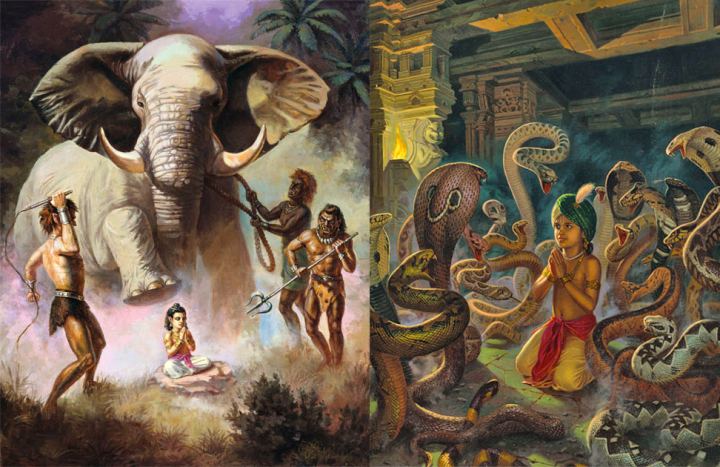
An advanced devotee will see Krishna as their only maintainer and have complete confidence that Krishna will provide for all their needs. I need to do my part, but I know that ultimately Krishna is the source of my maintenance. This faith is central to surrender, and deep faith in this principle releases me from much anxiety. We can develop faith in Krishna as our maintainer by reading stories about how He maintains His devotees. There are many stories in the scriptures which demonstrate Krishna’s commitment to provide for His devotee’s needs and well-being. The story of Sudama Brahmana in the KRSNA Book is one such example.
Another example of Krishna maintaining His devotee is in the story of Mrigari the Hunter. When Narada Muni approached Mrigari, he asked him to give up his sinful habit of half-killing animals and leaving them to die. He explained the law of karma to Mrigari, telling him how in his next life he would have to suffer a fate similar to that of the animals he was torturing. When Mrigari accepted Narada Muni as his spiritual master, Narada asked him to break his bow. But Mrigari hesitated, wondering how he and his family would survive if he gave up his means of livelihood. Narada then assured him that if he engaged in serving Krishna, Krishna would provide for all his needs. Mrigari followed Narada’s instructions, breaking his bow and dedicating his time to chanting Krishna’s names.
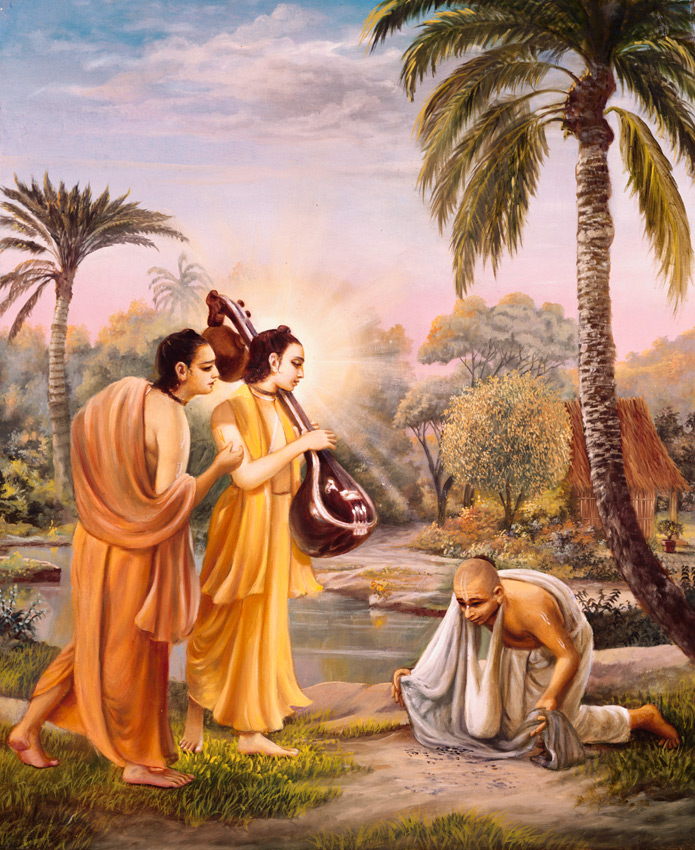
Mrigari’s neighboring villagers became aware of the amazing transformation that had taken place – that a cruel hunter had become a gentle devotee of the Lord. They began to honor him as a saintly person, and every day they would bring food to him and his family. In fact, the quantity of food was far more than his needs, and he had to ask that the amount be reduced.
Hearing such stories helps us have faith in seeing Krishna as our maintainer. And such faith enables us to stretch our surrender further, perhaps devoting more of our time and energy to our spiritual practices. When we fail to starve to death, this enables us to further experience how Krishna is maintaining us. Gradually our faith will grow and our anxiety for our material well-being will decrease. I know personally that when I was younger, I was in much more anxiety about my material needs, about providing for myself and my family. But Krishna has shown me time and time again that He is always looking after me, there is always enough money and enough food – all my real needs are met.
Many years ago, I was with my wife living in New Zealand, and we went through a period where we ran out of money. I was between jobs and my first child, Sharma, was just a baby. All we had to eat was a big bag of brown rice, and after eating only brown rice for a few days we were very sick of it. I was just about to start a new job, and as I left in the morning to go to work, my wife said to me: “I can’t bear the thought of eating brown rice again. Even if we had some sort of green vegetable to add to it, it wouldn’t be so bad.” I walked out of the door feeling terrible, feeling I was such a failure as a husband, father and provider. As I was about to cross the road, a truck drove past and a cabbage fell off the back and rolled over to my feet. I picked it up and ran inside, saying “I’ve got a cabbage! I’ve got a cabbage!” We were both very happy and I realized that Krishna was there, He knew my needs and He was maintaining me.
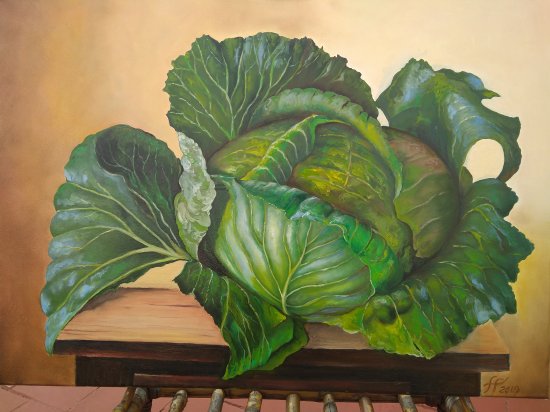


Leave A Reply